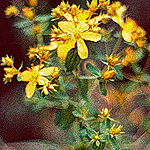|
|
The Eclectic Physician
Medicinal Herb Monographs
St Johnís Wort
Botanical Name
Hypericum perforatum
|

Hypericum perforatum
(St.John's Wort)
|
The information on this page compiled by
Beth Burch N.D.
Index
(click on the keywords)
Introduction
St. Johnís Wort has a long history of use for a variety of conditions.
Kingís American Dispensatory lists its actions as sedative, astringent
and diuretic useful for nervous affections with depression, hemorrhages,
diarrhea and chronic urinary tract problems. It is specific for spinal
injuries and is used externally for bruises, wounds, ulcers and tumors.
Weissí Herbal Medicine states it is useful as an antidepressant , as well
as treatment of bed wetting (enuresis) and night terrors in children. Recent
research has confirmed that St. Johnís Wort is an effective antidepressant
with few side effects.
[ Back to the Index. ]
Description
-
St. Johnís Wort is Hypericum perforatum, a beautiful plant which flowers
around the summer solstice, hence its name, for St. Johnís day, June 24.
It is a perennial, found in disturbed areas and considered a noxious weed
in many parts of the US. It grows 1-3 feet tall with small oval leaves
with tiny dots. When held up to the light these glands make the leaf appear
perforated, thus the species name. The flowers are a deep bright yellow,
about an inch in diameter with five petals. The petals have numerous black
dots, containing a red pigment. The upper tops of the flowering plant are
the medicinal part.
[ Back to the Index. ]
Constituents
-
Contains at least 10 constituents or groups of constituents that may contribute
to its effects.
-
Hypericin complex, including hypericin, pseudo-hypericin, isohypericin
& protohypericin
-
Flavonoids including hyperoside, quercitin, rutin & biflavones
-
Hyperforin-a phloroglucinol derivative
-
Volatile oils including n-alkanes, a-pinene and other monoterpenes
-
Tannins
-
Procyanidins
[ Back to the Index. ]
Action/Effects
-
Antidepressant/Sedative- Experimental studies have shown that hyperforin
exhibits serotonin reuptake inhibition (1,2)
-
Anti-inflammatory
-
Anti-bacterial
-
Indications
-
Internally-
-
Mild to moderate depression (3,4,5)
-
Externally-
-
Wounds, bruises, burns
-
Myalgia (muscle pain).
[ Back to the Index. ]
Dosage
-
Dry extract or freeze-dried- Look for an extract assayed for hyperforin
content, 300 mg one to three times a day
-
Liquid Extract- 1:1 made with fresh plant- 1/4-1/2 teaspoon one to three
times a day
-
Take with food to minimize possible gastrointestinal upset
-
May take 4-8 weeks to get optimal effects. Assess the response after 6
weeks and adjust dosage at that time. If no response after 6 weeks, consult
a physician.
[ Back to the Index. ]
Side Effects
-
Gastrointestinal upset
-
Allergic reactions
-
Dizziness
-
Tiredness/Fatigue
-
Restlessness
-
All side effects are completely reversible- stop taking the St. Johnís
Wort and side effects go away
-
May cause a photosensitivity reaction in some people- use sunscreen and
avoid sun exposure while taking St. Johnís Wort.
[ Back to the Index. ]
Contraindications
-
Severe depression (with suicidal, psychotic, or severe melancholic symptoms)
-
Bipolar depression (manic-depressive illness)
[ Back to the Index. ]
Interactions
with medications
-
Donít combine with prescription antidepressants (6,7)
-
May interfere with iron absorption (7)
[ Back to the Index. ]
Use in
pregnancy & lactation
-
No information on the safety of use in pregnancy or lactation
-
It is known that St. Johnís Wort inhibits pituitary secretion of prolactin,
so the possibility exists that there could be problems with breast milk
production
[ Back to the Index. ]
References
1. Singer A et al, Hyperforin, a major antidepressant constituent
of st. John's wort, inhibits
serotonin uptake by elevating free intracellular Na, J Pharmacol Exp
Ther 1999;290(3):1363-8
2. Chatterjee SS et al, Hyperforin as a possible antidepressant component
of hypericum extracts, Life Sci 1998;63(6):499-510
3. Laakmann G, St. John's wort in mild to moderate depression: the
relevance of hyperforin for the clinical efficacy, Pharmacopsychiatry 1998;31
Suppl 1:54-9
4. Lenoir S et al, A double-blind randomized trial to investigate three
different concentrations of a standardized fresh plant extract obtained
from the shoot tips of Hypericum perforatum, Phytomedicine 1999;6(3):141-6
5. Josey ES et al, St. Johnís wort: a new alternative for depression?,
Int J Clin Pharmacol Ther 1999;37(3):111-9
6. Lantz MS et al, St. John's wort and antidepressant drug interactions
in the elderly, J Geriatr Psychiatry Neurol 1999;12(1):7-10
7. Miller LG, Herbal medicinals: selected clinical considerations focusing
on known or potential drug-herb interactions, Arch Intern Med 1998;158(20):2200-11
8. Ernst E et al, Adverse effects profile of the herbal antidepressant
St. Johnís wort (Hypericum perforatum), Eur J Clin Pharmacol 1998;54(8):589-94
[ Back to the Index. ]
* The information presented in this web site is intended to inform and educate.
It is not intended replace a qualified medical practitioner to diagnose or treat medical conditions.
|
|

